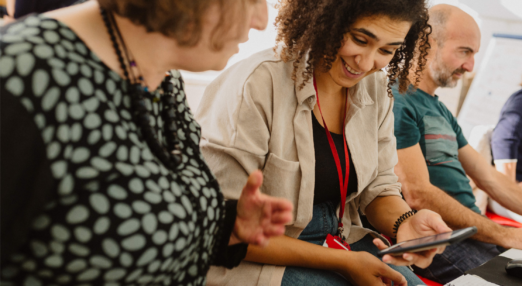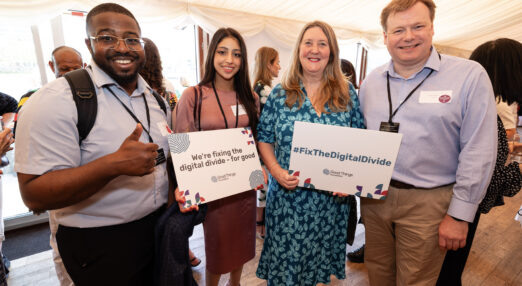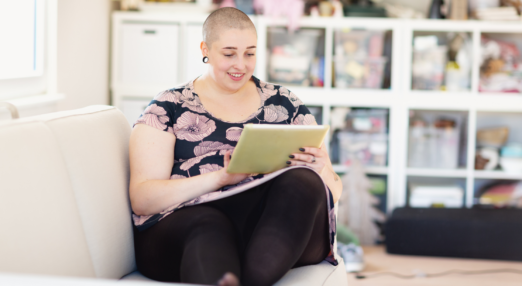Five ways digital exclusion affects people
Natasha Bright-Wray, Associate Director of Communications, Campaigns and Advocacy, reveals five alarming realities faced by those who are digitally excluded in the UK.
I’m Natasha Bright-Wray, Associate Director of Communications, Campaigns and Advocacy. At Good Things we advocate for digital inclusion, working hard to give everyone the opportunity to improve their lives through digital. While we know there are many negative effects when people don’t have access to data, devices or digital skills, here we’re going to focus on things that are happening to digitally excluded people in the UK.
1 in 5 people have stopped using products or services because they’re only available online.
It’s kind of hard to believe isn’t it? This is happening as the number of NHS App users jumps from 22 million to 30 million people in the UK and the Government boasts that we’re becoming a digital superpower.
But what about those non-users who aren’t using online products or services? The digitally excluded people who are forgotten as we move to a new digital landscape. Recently historian Amanda Vickery witnessed “some old ladies [turned away from a breast cancer clinic] because they didn’t have an SMS message from an app. They didn’t even have a phone… Appalling. And ageist!”
This isn’t a stand-alone incident, it’s a surprise we don’t see it reported more often. 1 in 5 adults lack basic digital skills (Lloyds Bank, 2022) and research shows that 5.8 million people are estimated to remain digitally excluded by the end of 2032, if no further action is taken (Cebr, 2022).
1 in 3 people worry that they are unable to access services in a way that a provider wants them to.
Think back to the elderly women who were unable to access support at a breast cancer clinic, and the worry that it will be causing those who are unable to access similar services in “the right way.”
From government services like Universal Credit, to healthcare, even apps and websites designed to make shopping easier – but have really added a poverty premium to those who are digitally excluded… The ways in which people access products and services is changing.
I spoke to the Observer to flag how digitally excluded people are largely forgotten. Forgotten by service designers, as they automate and digitise – and forgotten by a Government that hasn’t invested in digital inclusion, let alone has any meaningful digital inclusion strategy (the last one was launched in 2014 and I think it’s fair to say that the world has moved on significantly since then).
“The scale of the problem is a direct consequence of the Government’s political lethargy” said the House of Lords Communications and Digital Committee’s Conservative Baroness, Tina Stowell. Their report exploring digital exclusion and the cost of living casts a damning light on the current Conservative Government, as they focus on becoming a digital superpower above ensuring no one is left behind.
Three quarters of people would feel cut off from society if they didn’t have access to the internet.
The endless scroll, flicking between various social media platforms, to email, to Whatsapp and back again. Our polling showed that three quarters of people would feel cut off from society, socially isolated, without access to the internet.
Some digitally excluded people have just arrived in the UK, from war torn countries, hoping to contact their loved ones. I heard recently how one of the incredible digital inclusion hubs in the National Digital Inclusion Network helped almost 100 refugees with mobile connectivity through the National Databank – enabling them to remain connected in the most difficult of times.
Of course this example only represents a segment of digitally excluded people living in the UK right now. Some people experience data poverty on a regular basis, meaning that one month they’re connected, until their data runs out. Some people have had to make tough choices – especially in the cost of living crisis – between what is considered to be ‘essential’ and what others believe to be a ‘luxury’.
Digital exclusion is linked with social and economic exclusion, and intersects with a range of characteristics including age, disability, geography, education, and housing. At Good Things Foundation, we expect to see widening gaps between those engaged and excluded with impacts on education, employment, economic growth, health access and outcomes.
Public wifi is an important part of our public infrastructure with more than a third of people rely on it once a week or more.
Without access to data, people are cut off from the basic daily activities that most people take for granted. They are cut off from contacting loved ones, from job interviews, from finding essential health or other information online, and cut off from digitised public services.
Our polling shows that more than a third of UK citizens rely on public wifi. As the cost-of-living crisis continues, and more people are making the difficult choices between food and connectivity, we believe that no-one should be left behind. The National Databank brings free mobile internet data connectivity to people who can’t afford it and who are often also experiencing multiple inequalities in today’s society. Think of it like a ‘food bank’ but for internet connectivity data.
Access to a reliable device is precarious for many – with large numbers of people using devices that they don’t own or pay for
Our polling shows that 43% of people rely on a device that they don’t own or pay for. This figure sits uncomfortably next to our data which shows that 2 out of 5 homes have at least one redundant device that they don’t use, and around 30 million redundant devices in households across the UK.
This year Good Things Foundation launched the National Device Bank with leading sustainable electronic refurbishing company Reconome – wiping and refurbishing corporate technology to donate to those who are unable to afford a device.
Through the National Device Bank, since April 2022, 4,429 devices have been given to 267 hubs to distribute to people in their community, with more on the way. But demand for the devices we are able to distribute (that have been donated from businesses, refurbished and wiped securely) is five times greater than those we receive.
We want to scale up our National Device Bank, and are reliant on the support of businesses donating their used tech to do this. Could you donate unused laptops, mobile phones or tablets? Find out more about the National Device Bank.
Good Things Foundation recently conducted polling with Public First and the results show how digitally excluded people are negatively affected in the digital age. If you want to find out more about Good Things Foundation, a good place to start is our latest Impact report, looking at our progress since we launched our latest strategy.
Read more Good Things
-

Community action is transformative: Hubs engage with their MPs on digital inclusion
At the forefront of activism are UK digital inclusion hubs, which make up our National Digital Inclusion Network. These hubs not only deliver essential digital inclusion products and...
-

Annual Impact Report
Since launching our new strategy in April 2022, we've accomplished some amazing milestones for digital inclusion.
-

People in the UK calling for action on digital exclusion
We’re advocating that the current and any future Government prioritise digital exclusion. New polling data shows that people in the UK are supportive, and are calling for action....
